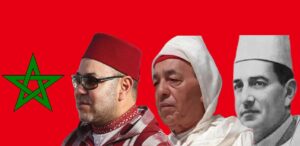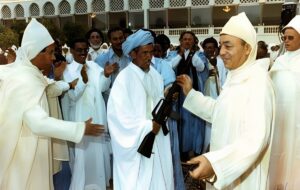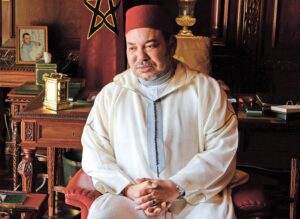Reforming the Security Council and expanding its permanent membership... Who represents the African continent?!

The Algerian generals' media outlets are constantly promoting their pathetic propaganda lie about their country obtaining non-permanent membership in the Security Council by an "overwhelming majority," deliberately ignoring the fact that the entire process was to endorse the five seat occupants from the world's different continents, with the exception of a single vote on the European representative, in which the Belarusian delegate suffered a crushing defeat as a result of his opposition to the continent's consensus candidate. In simpler terms, the four countries that have entered the Security Council since the beginning of the year received almost the same number of votes (184), in an endorsement process in which there was no candidate competing with Algeria or any other country. Therefore, there is no real reason for this false pride; not to mention the fact that the ten non-permanent seats in the Security Council "do not resolve or bind" with regard to the world, the continents they represent, or even their own countries if they are the subject of the vote. For example, Algeria's presence on the Security Council will not benefit the African continent at all - contrary to the false propaganda of the regime's mouthpieces - and through this presence, it will not be able to change a single letter in the resolution renewing MINURSO's mandate, for example, or exempt itself from attending roundtables with de Mistura, the Secretary-General's representative. So what is the justification for all this fuss?!
This discussion brings us to the topic of reforming the United Nations, which was established by the victors of World War II nearly eighty years ago, specifically the Security Council, in terms of its composition and powers. Everyone knows that the real power in the Council lies in the hands of the five permanent members (the United States, Britain, France, China, and Russia), with the remaining ten members merely "decoration" to beautify the image. This reality has been proven by the global crises of the past eight decades, where the right of veto was the weapon used by the five powers, who earned the title of "superpower," to obstruct any solution they disliked or that threatened their international influence.
It's true that talk of Security Council reform isn't new. It's been raised repeatedly before being shelved due to disagreement over its criteria, although there is consensus on its justifications. How can France be granted a seat while Germany, Japan, or India were denied it, simply because they were on the victorious side in World War II? How can a UN Security Council be formed without African or Latin American representation? What has renewed discussion of the issue these days is the world's unequivocal move toward a multipolar world, the public and strong support for the idea of expanding the Security Council by the administration of US President Joe Biden, and other less important reasons. The "natural" candidates for membership in the Council are Germany, Japan, India, and Brazil. The dispute remains limited to the representative of the African continent, where some aspiring powers—primarily by virtue of history and demographics—have a clear advantage over two contenders who appear more qualified than the rest to represent the continent. How can that be?
Before delving into the names of the candidates and their real chances, we must initially agree on a set of basic criteria, most or all of which must be met by the African continent’s representative on the Security Council. Perhaps the most important of these are: the confidence of the largest number of countries on the continent in him to represent them and defend their interests; the strength of his diplomatic influence on the international scene; his deep understanding of the continent’s fundamental problems and his actual involvement in efforts to address them; the possession of balanced relations with the major powers in both the Western and Eastern camps; not to mention other less important qualities such as economic and human weight, etc.
As for Africa, the vast continent, we note the absence of a unifying pole, as opposed to the presence of regional blocs in the various regions of the continent: North Africa, Southern Africa, East Africa, West Africa, and finally Central Africa, with one dominant regional power or more competing for leadership. In the North of the continent, competition is almost limited to two countries: Egypt and Morocco, with Morocco having a clear advantage based on the criteria we mentioned earlier, and as we will detail later. Algeria, on the other hand, is little more than a "verbal power," adept at acting as an agent for any other power, and has always followed South Africa's lead, not to mention its lack of any of the aforementioned qualifications. As for West Africa, leadership is a foregone conclusion for Nigeria, as is the case with South Africa in its own continental region. As for the East of the continent, there is an open three-way competition between Kenya, Tanzania, and Ethiopia—all of which are medium-sized powers unsuited to compete with the aforementioned poles—for the seat of the continent's representative on the Security Council. The same applies to Central Africa.
Here, it may be useful to present the strengths and weaknesses of the four candidates, according to the criteria we mentioned earlier, so as not to get distracted, and to determine who has the best chance among them. Let's start with Egypt, which finds itself in the position of a candidate by virtue of history and leadership!! Its African influence declined sharply after the era of President Gamal Abdel Nasser, specifically under President Hosni Mubarak. Despite President Sisi's attempts to restore this influence, at least in his immediate surroundings, the economic problems his country is grappling with, and other factors, have prevented and continue to prevent a radical improvement in Egypt's African standing. The failure to resolve the Grand Ethiopian Renaissance Dam crisis with a middle power like Ethiopia is only one manifestation of this inability. Accordingly, Egypt's diplomatic strength, its African relations outside its region, and its engagement in providing solutions to the problems of its surroundings are all weaknesses that place Egypt in fourth place among the candidates for the mission.
Not far from this assessment is Nigeria, the largest country on the continent in terms of population and national income, but also in terms of corruption and floundering in internal ethnic, religious, and other issues. This limits its ability to control its surroundings, as was evident in its handling of the coups in West Africa (Mali, Burkina Faso, and Niger). Like Egypt, where countries outside the continent wield influence beyond its own in its regional sphere, we find a similar situation in Nigeria's immediate surroundings, which makes its chances of securing a permanent seat on the Security Council slim.
Thus, the competition is limited to the two most prominent powers on the continent, Morocco and South Africa. This may explain the latter's strange hostility towards everything that concerns Morocco, despite its honorable positions in the battle to liberate it from apartheid, and despite the geographical distance and the lack of real competition between the two countries. The candidacies of Morocco and South Africa seem natural from an international perspective, given their continental diplomacy and influence, their balanced relations with other major powers, the clear development of their economies, and the promising prospects they have the right to pursue. Accordingly, it can be said that the most important deciding factor will be the voice of Africans and the extent of the continent's countries' conviction in the two countries' ability to defend the interests of other African countries. If we look at South Africa's continental reach, we find it primarily concentrated in its immediate surroundings in the south of the continent, with some influence in the countries of the east and central (English-speaking) continent, not to mention its satellite, Algeria, and to a lesser extent, Egypt. As for Morocco, despite its overwhelming superiority in the west and center of the continent, it has been able to achieve major inroads into the east of the continent and the countries of the Horn of Africa, and its presence has even extended to two or more countries in the south of the continent. Another point that serves Morocco's interest is its commitment to finding solutions to the continent's economic, political, security, and other problems. This is achieved through its initiative to connect African countries bordering the Atlantic Ocean, linking the countries of the western part of the continent to the Nigerian gas pipeline, providing a sea outlet for the landlocked Sahel countries, and ensuring food security in the western (Nigeria and Ghana), central (Cameroon and Rwanda), and eastern (Ethiopia, Tanzania, and Kenya) regions of the continent through its fertilizer projects, which are needed by various countries on the continent. All of these are practical initiatives that will gain Morocco the trust of various parts of the African continent. As for South Africa, its "blind" hostility towards Morocco and its relentless pursuit of secession within it will cause Africans to lose confidence in the wisdom of the South African regime, and consequently its inability to defend the interests of a continent rife with border disputes and internal divisions!!
Morocco's position on the continent has been continuously strengthened due to the genius of the strategy developed and implemented by the King, with the help of efficient government agencies and a vibrant national private sector, spanning various sectors that the continent desperately needs (banking, communications, transportation, real estate and equipment, etc.), all within the framework of a win-win equation and South-South cooperation. Its firm stances in confronting the French colonizer of the African continent have increased its credibility among Africans and granted Morocco the confidence of its brothers, who have accepted its leadership in the battle for development, free from the colonizer and its tools.
The timing of this international obligation requires that the international landscape stabilize, and the outcomes of its open conflicts (the Middle East and Ukraine) and perhaps even postponed conflicts (Taiwan) become clear. This will ensure that the Security Council's modernization becomes one of the hallmarks of a multipolar international system based on cooperation and mutual respect. Who in Africa, like Morocco, can defend these values and advance the continent's interests in a turbulent international environment?





